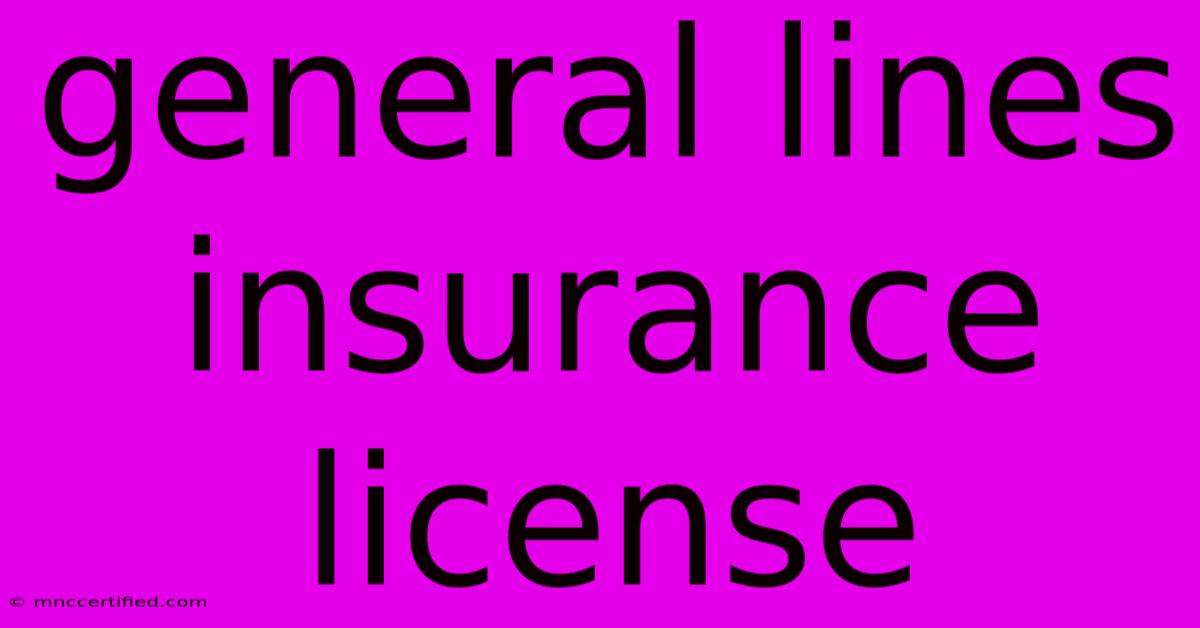General Lines Insurance License

Table of Contents
Navigating the World of General Lines Insurance Licenses: A Comprehensive Guide
Obtaining a general lines insurance license is a significant step for anyone aspiring to work in the insurance industry. This comprehensive guide will walk you through the process, addressing key requirements, common challenges, and strategies for success. We'll cover everything from eligibility criteria to continuing education requirements, equipping you with the knowledge you need to navigate this crucial step in your career.
Understanding General Lines Insurance Licenses
A general lines insurance license allows you to sell a wide range of insurance products, encompassing various lines of coverage. This differs from a limited lines license, which restricts you to specific product types. The breadth of coverage included under a general lines license varies by state, but typically includes:
- Property Insurance: Protecting buildings and personal belongings from damage or loss.
- Casualty Insurance: Covering liability for accidents or injuries. This often includes auto insurance.
- Life Insurance: Providing financial protection for beneficiaries upon the insured's death. Note: Some states separate life insurance licensing.
- Health Insurance: Protecting individuals and families against medical expenses. Again, this often requires a separate license.
Key takeaway: A general lines license offers significantly more career opportunities than a limited lines license.
Eligibility Requirements: State-Specific Variations
The requirements for obtaining a general lines insurance license vary significantly by state. It's crucial to research your specific state's requirements. These typically include:
- Age: Most states require applicants to be at least 18 years old.
- Residency: You may need to be a resident of or work in the state where you are applying.
- Background Check: A thorough background check is standard practice to ensure suitability for the profession. Criminal records and certain financial issues can disqualify applicants.
- Pre-Licensing Education: Completion of a state-approved pre-licensing course is generally mandatory. This course covers fundamental insurance principles and state-specific regulations.
- Examination: Passing a state-administered insurance licensing examination is essential. These exams are rigorous and test your understanding of insurance concepts and laws.
Preparing for the Exam: Tips for Success
Effective preparation is key to passing your insurance licensing exam. Consider these strategies:
- Use approved study materials: Choose high-quality study guides and practice exams specific to your state's exam.
- Create a study schedule: Establish a realistic study plan to ensure you cover all the necessary material.
- Focus on weak areas: Identify your weaker areas and dedicate extra time to mastering those concepts.
- Practice, practice, practice: Take numerous practice exams to simulate the test environment and identify knowledge gaps.
The Application Process: A Step-by-Step Guide
Once you've completed your pre-licensing education and passed the exam, the application process generally involves:
- Submitting the application: Complete the application form accurately and thoroughly.
- Paying the fees: Insurance licensing fees vary by state.
- Providing supporting documentation: Submit the required identification, background check results, and other supporting documentation.
- Fingerprinting: You may be required to submit fingerprints for a background check.
- License issuance: Upon successful completion of all steps, your license will be issued.
Important note: Processing times can vary depending on the state and the volume of applications.
Maintaining Your License: Continuing Education
After obtaining your license, maintaining it requires ongoing commitment to continuing education. Most states mandate a certain number of continuing education credits each year to keep your license active. These courses typically cover updates to insurance laws, regulations, and industry best practices. Failure to complete the required continuing education can result in license suspension or revocation.
Choosing the Right Career Path: Opportunities with a General Lines License
A general lines insurance license opens doors to various career opportunities within the insurance industry. Consider these paths:
- Insurance Agent: Selling insurance directly to clients.
- Insurance Broker: Representing multiple insurance companies and helping clients find the best coverage.
- Underwriter: Assessing insurance applications and determining risk levels.
- Claims Adjuster: Investigating and processing insurance claims.
Conclusion: Your Journey to Success in the Insurance Industry
Obtaining a general lines insurance license is a challenging but rewarding endeavor. By thoroughly understanding the requirements, preparing effectively for the exam, and navigating the application process diligently, you can establish a successful career in the dynamic world of insurance. Remember that continuous learning and staying updated with industry changes are vital to long-term success in this field. Good luck!

Thank you for visiting our website wich cover about General Lines Insurance License. We hope the information provided has been useful to you. Feel free to contact us if you have any questions or need further assistance. See you next time and dont miss to bookmark.
Featured Posts
-
Las Vegas Gp 2024 Qualifying Results
Nov 24, 2024
-
Arrow Insurance Breckenridge Co
Nov 24, 2024
-
Hawkeyes Win Stevens Leads Rush
Nov 24, 2024
-
Homeowners Insurance Redding Ca
Nov 24, 2024
-
Predicted Xi Hearts Vs Celtic Carter Vickers
Nov 24, 2024